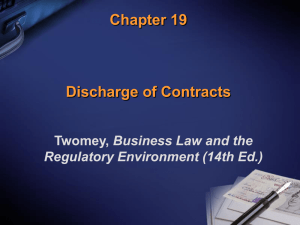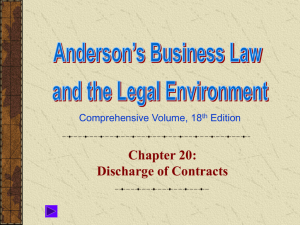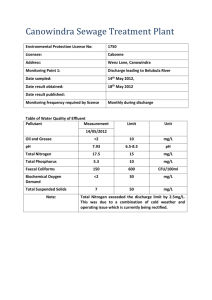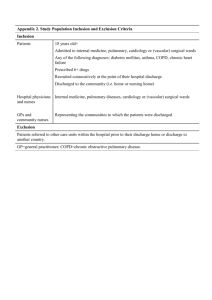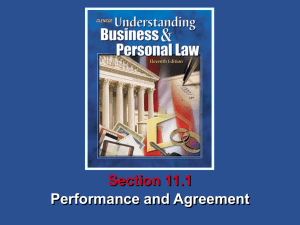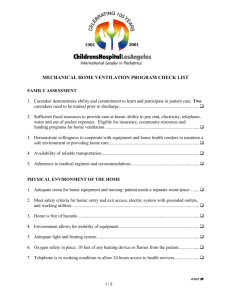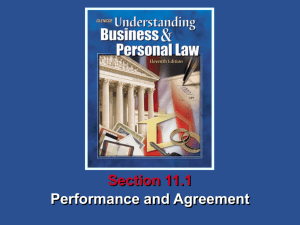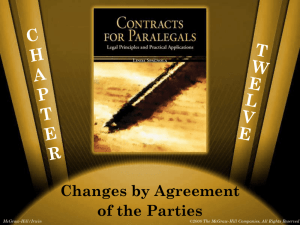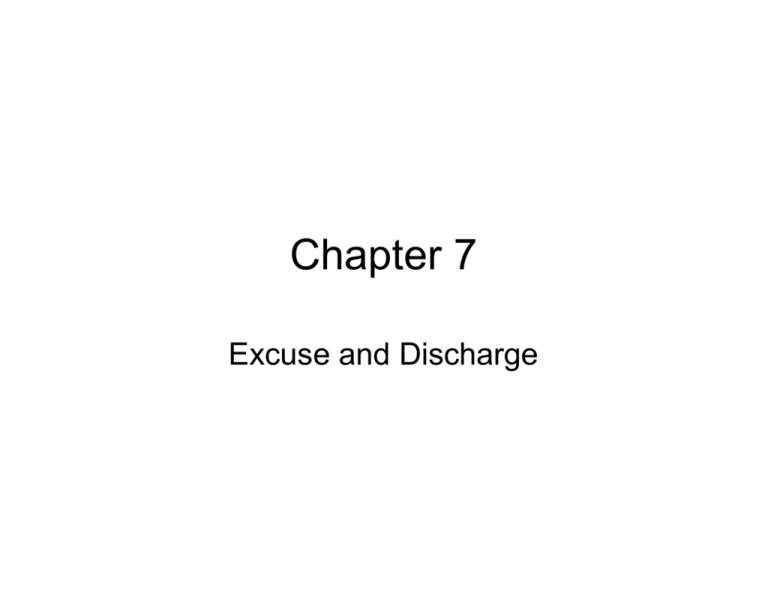
Chapter 7
Excuse and Discharge
I.
•
Excuse and Discharge of
Contractual Obligations
A. Excuse or Discharge – Party to perform can be
legally excused to do so
1.
2.
3.
4.
5.
6.
7.
8.
9.
10.
11.
12.
Mutual Rescission
Release
Novation
Accord and Satisfaction
Checks marked “payment in full”
Contract Modifications
Bankruptcy
Statutes of limitations
Doctrine of Impossibility
Impracticability
Frustration of Purpose
Performance of Contractual Obligations (MOST COMMON)
B. Mutual Rescission
1.
2.
3.
With a bilateral contract and no performance, parties
may mutually agree to rescind the contract.
Rescission – cancellation of the contract by mutual
agreement.
Only w/ a Bilateral contract
•
4.
Executory Contract – a contract where no performance
has taken place
•
5.
Unilateral contract does not have performance Æ cannot have
rescission
Rescission is not effective unless the contract is fully executory
Executed Contract – a contract where all performance
has taken place (Think also the signing of the contract)
C. Release
1.
A party to the contract voluntarily gives up some or all of his
contractual rights
2.
CL requires additional consideration
3.
UCC §1-107 – No additional consideration is necessary, so long
as written and signed by both parties.
A form of compromise
Ex. 7.1
Releasor – Party giving up rights
Releasee – party being discharged from liability for non-performance
Mutual Release – Each party discharges other’s remaining duties
* Look at release language from contract handout.
D. Novation
1. A substituted contract that discharges a duty
by adding a party who was neither the obligor
or the obligee of that duty
•
Æ Creates a new contract between remaining party and
the substitute.
2. Requires mutual agreement of all three parties
3. No recourse against original contract maker
P1
O
P2
O
P1
O
E. Accord and Satisfaction
1.
2.
3.
Discharge of performance because parties set up
substituted performance
“Substituted Contract”
Confined to remedies under substituted contract
•
•
Duty under original contract is discharged
Debtor / Creditor
Accord – Agreement that different performance will be
substituted for the original performance
Satisfaction – The performance of the accord
Discharge of duty under original agreement is upon
satisfaction
Discharge of duty once the new agreement is made
F. Checks: “Payment in full”
1.
2.
Only for unliquidated debt (disputed or uncertain amount)
Payment of a debt with a check marked “payment in full” Æ
Accord
•
3.
•
Satisfaction is the deposit of the check
Liquidated Debt (Certain or undisputed amount of money owed)
Some JD keep original debt still owed
–
–
§1-207 A party who with explicit reservation of rights performs or
promises performance or assents to performance in a manner
demanded or offered by the other party does not thereby prejudice
the rights reserved. Such words as “without prejudice”, “under
protest”, or the like are sufficient. (p. 140)
Colorado – Anderson v. Rosebrook, 737 P.2d 417 (Colo. 1987) Common-law doctrine of accord and satisfaction as applied to “full
payment” or “conditioned” checks is not altered by Uniform
Commercial Code provision involving performance under reservation
of right;
G. Modification
1. Mutual agreement to change terms of
contract – some or all of the original
duties are discharged
2. Additional consideration is typically
required unless modification is in writing
II.
Discharge by Operation of Law
A. Bankruptcy
1. Debts under the contract are discharged
2. Private contract debts are not
enforceable against someone after filing
bankruptcy
B. Statutes of Limitation
1. Law that places a time limit on the right
to file a lawsuit
2. Cannot sue once time in the statute has
run
C. Discharge by Full Performance
1. Legal effect of performance is discharge
of any further obligation
2. MOST COMMON FORM OF
DISCHARGE
III.
Impossibility of Performance
A. Impossibility
•
Where certain Acts under the contract have become
objectively impossible Æ the contractual obligation is
discharged
Compare w/
B. Impracticability
•
•
Not impossible to perform, but can be done only with
excessive or unreasonable efforts or costs
Case: Taylor v. Caldwell
•
•
•
Facts: Rental hall burned down
Performance under the contract became impossible (w/o
fault to either party)
Parties’ duty of performance was discharged
C. Will likely occur when
1.
2.
3.
4.
5.
Destruction of subject matter
Supervening illegality or govt. acts
Failure of specific and exclusive source of supply
Destruction of repair or remodel project
Destruction of goods BEFORE the risk of loss (ROL)
has passed to buyer
•
•
•
•
•
•
6.
Shipped goods: ROL passes when delivered to carrier
Shipped to particular destination: ROL passes at destination
No Shipment and Merchant Seller: When buyer receives goods
No Shipment and non-merchant: When Seller tenders delivery
UCC, F.O.B. “Place”: Seller assumes responsibility until goods
reach “Place”
UCC F.A.S. “Vessel”: Seller must deliver goods alongside
“Vessel”
Death or severe illness of performing party
IV. Partial Impossibility or
Impracticability
A. Performance still due to extent possible unless
useless or close to it
1. Can suspend rather than discharge
2. Courts will discharge only if hardship caused by
delay is substantial
3. Audrey v. Republic Productions p. 148
Facts: Gene Autry the “Singing Cowboy”
Contract w/ Republic
Got drafted
Autry – Obligations were discharged
Studio – Only suspended
Court: So much had changed since being drafted, would be
hardship if asked to continue Æ Discharged his
responsibilities
V. Frustration of Purpose
•
Changed circumstances demonstrate
that contract cannot be performed for its
essential purpose
– Krell v. Henry
•
•
•
Facts:
Henry wanted room to watch
coronation of Edward VII
Krell advertised room with great view
King became ill, coronation did not take place
1. What is the purpose of the contract?
2. The Purpose was not fulfilled
3. Parties had not foreseen the event

